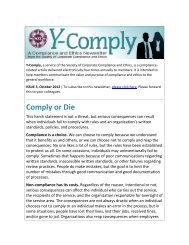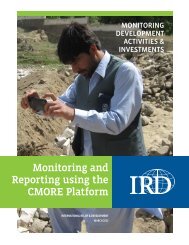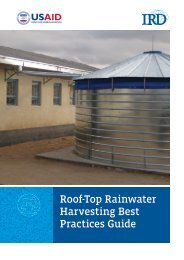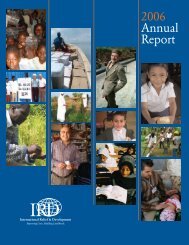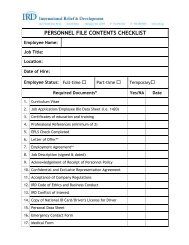Empowering citizens Engaging governments Rebuilding communities
Empowering citizens Engaging governments Rebuilding communities
Empowering citizens Engaging governments Rebuilding communities
Create successful ePaper yourself
Turn your PDF publications into a flip-book with our unique Google optimized e-Paper software.
Through its ICAP work, IRD had an<br />
established base of operations in<br />
Baghdad and an important logistical<br />
springboard for launching the much<br />
larger and more complex CSP<br />
them. IRD’s rapid response for relief and reconstruction<br />
work, in both kinetic and nonkinetic environments<br />
and often alongside military personnel, exemplified the<br />
changing face of development and the role of nongovernmental<br />
organizations (NGOs).<br />
Earning local trust<br />
IRD was able to launch and expand CSP quickly<br />
because it had been operating in Baghdad for three<br />
years implementing the Iraq Community Action<br />
Program (ICAP). By going into some of Baghdad’s most<br />
dangerous and at-risk neighborhoods when no other<br />
relief agencies were around, IRD began to gain local<br />
favor as it assisted a war-weary population to rebuild<br />
civil society.<br />
ICAP began operations in May 2003, as a way to mobilize<br />
Iraqi <strong>communities</strong> after decades of repression and<br />
to help <strong>communities</strong> identify, prioritize, and address<br />
their most pressing civic needs. Projects focused on<br />
rebuilding economic and social infrastructure, boosting<br />
business development, and providing assistance<br />
to civilian victims of war. Most important, the projects<br />
weren’t decreed by IRD, but decided in conjunction<br />
with locally organized community action groups.<br />
In Baghdad neighborhoods, where no legitimate sense<br />
of grassroots activism or democratic engagement<br />
had existed for years, community action groups gave<br />
ordinary <strong>citizens</strong> a direct role in a kind of decentralized<br />
decisionmaking that had been mostly missing<br />
from Iraq. With the help of these community groups,<br />
IRD completed almost 2,400 ICAP projects between<br />
2003 and 2006, at a value of more than $73 million.<br />
The program required an in-kind Iraqi contribution<br />
of 25 percent of project funds, but that number was<br />
exceeded by almost $10 million—another sign of<br />
Iraqis’ eagerness to be involved in their planning and<br />
development processes. Through community action<br />
groups, IRD helped put individual <strong>citizens</strong> directly<br />
in touch with government leaders during a time of<br />
upheaval and uncertainty. Even tenuous links between<br />
public and private interests, IRD believed, would help<br />
<strong>citizens</strong> regain some sense of trust in their local<br />
political system and open doors to broader improvements<br />
in their <strong>communities</strong>’ physical and social<br />
infrastructure.<br />
IRD’s close working relationship with the community<br />
continued throughout the evolution of ICAP, which<br />
ran concurrently with CSP and continued for years<br />
afterward as an even more robust mobilization and<br />
participatory program. After three years of focused<br />
community interaction with civilians and local leaders<br />
under ICAP, IRD had enough credibility among Iraqis to<br />
take on a program as large and military-dependent as<br />
CSP—and to make it work.<br />
Stabilizing <strong>communities</strong><br />
CSP kicked off in June 2006, a few months ahead of a<br />
highly publicized military surge by US and international<br />
forces. It ended more than three years later, in late<br />
2009. Throughout implementation, IRD staff found<br />
themselves under pressure, pulled in a variety of<br />
directions by competing and sometimes contradictory<br />
demands from multiple stakeholders. But they also<br />
implemented hundreds of projects that brought order<br />
and economic revitalization to an oppressed population<br />
in the middle of a war zone.<br />
CSP’s main goal can be summarized in one statement:<br />
reduce or eliminate incentives for individuals to participate<br />
in insurgent activities by creating employment<br />
opportunities and fostering community engagement. In<br />
Iraq, people were desperate for jobs, so employment<br />
is where CSP focused its financial muscle. More than<br />
90 percent of the program’s funds were geared toward<br />
short- and long-term employment. As the implementing<br />
3


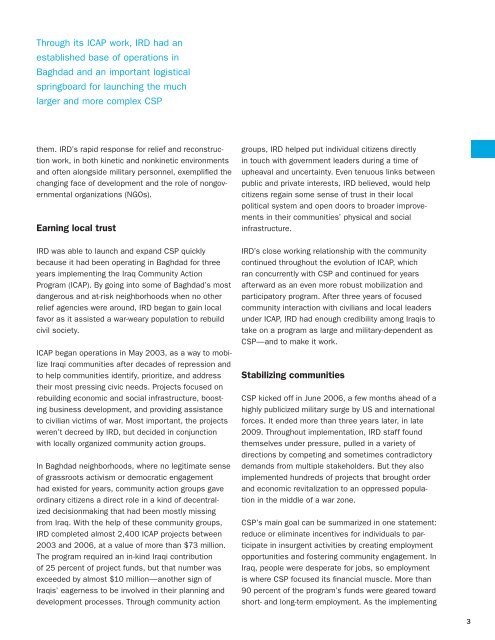
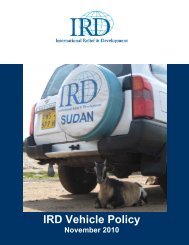
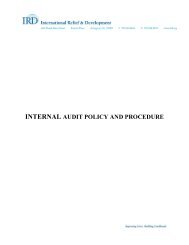
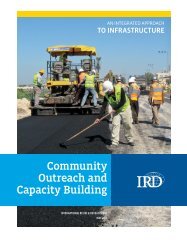
![Guide bonne pratique production d'oignon qualité_VF_4_2411012[1]](https://img.yumpu.com/23506639/1/184x260/guide-bonne-pratique-production-doignon-qualitac-vf-4-24110121.jpg?quality=85)

